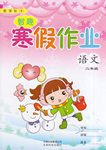题目内容
完形填空 (共20小题,每小题1分,满分20分)
Are you carrying too much on your back at school? Lots of kids at the same age as you are. Not only are students in China ___36___ from this problem, but kids in the United States are ___37___ fed up with(饱受…之苦) heavy school bags.
Experts are starting to___38___ that more and more young students are having back and neck problems as a result of school bags ___39___ too heavy for them. “It’s hard for me to get up the___40___ with my bag because it’s so heavy,” said Rich Hammond, ___41___ 11-year-old student in the US. Rick is among the students who have ___42___ backpacks with two straps (带子) to carry them, ___43___ a number of other students choose rolling backpacks. However, even with rolling backpacks, ___44___ up stairs and buses with them is ___45___ a problem for kids. Many of them have hurt their knees, backs or necks because of heavy school bags.
But how much is too ___46___? Experts say students should carry ___47___ more than 10 to 15 per cent of their own body weight. Scott Bautch, a Wisconsin ___48___ doctor, said kids under 4th grade should ___49___ with 10 per cent. But it’s also important that older kids don’t go ___50___ 15 percent, because their bones are still growing. Bautch explained that there are other injuries caused by backpacks. “Kids are ___51___ their balance and falling down with these backpacks,” he said.
Parents and teachers are starting to tell the kids to only take ___52___ library books they will be reading that night. Some teachers are using worksheets (作业纸) or ___53___ workbooks for students to take home. One of the best answers is, as some ___54___ themselves suggested, to have no homework ___55___!
36. A.meeting B.facing C.experiencing D.suffering
37. A.already B.always C.yet D.also
38. A.explain B.say C.worry D.announce
39. A.being B.be C.are D.is
40.A.schools B.stairs C.houses D.homes
41.A.this B.that C.a D.an
42.A.special B.unusual C.ordinary D.regular
43.A.when B.but C.then D.and
44.A. getting B.climbing C.going D.turning
45.A.only B.still C.even D.just
46.A.more B.very C.much D.many
47.A.no B.not C.any D.much
48.A.children B.student C.bag D.back
49.A.carry B.stay C.take D.bring
50.A.about B.under C.beyond D.before
51.A.keeping B.missing C.losing D.making
52.A.home B.class C.school D.city
53.A.valuable B.thin C.important D.interesting
54.A.reports B.teachers C.parents D.kids
55.A.at all B.after all C.in all D.for all
Are you carrying too much on your back at school? Lots of kids at the same age as you are. Not only are students in China ___36___ from this problem, but kids in the United States are ___37___ fed up with(饱受…之苦) heavy school bags.
Experts are starting to___38___ that more and more young students are having back and neck problems as a result of school bags ___39___ too heavy for them. “It’s hard for me to get up the___40___ with my bag because it’s so heavy,” said Rich Hammond, ___41___ 11-year-old student in the US. Rick is among the students who have ___42___ backpacks with two straps (带子) to carry them, ___43___ a number of other students choose rolling backpacks. However, even with rolling backpacks, ___44___ up stairs and buses with them is ___45___ a problem for kids. Many of them have hurt their knees, backs or necks because of heavy school bags.
But how much is too ___46___? Experts say students should carry ___47___ more than 10 to 15 per cent of their own body weight. Scott Bautch, a Wisconsin ___48___ doctor, said kids under 4th grade should ___49___ with 10 per cent. But it’s also important that older kids don’t go ___50___ 15 percent, because their bones are still growing. Bautch explained that there are other injuries caused by backpacks. “Kids are ___51___ their balance and falling down with these backpacks,” he said.
Parents and teachers are starting to tell the kids to only take ___52___ library books they will be reading that night. Some teachers are using worksheets (作业纸) or ___53___ workbooks for students to take home. One of the best answers is, as some ___54___ themselves suggested, to have no homework ___55___!
36. A.meeting B.facing C.experiencing D.suffering
37. A.already B.always C.yet D.also
38. A.explain B.say C.worry D.announce
39. A.being B.be C.are D.is
40.A.schools B.stairs C.houses D.homes
41.A.this B.that C.a D.an
42.A.special B.unusual C.ordinary D.regular
43.A.when B.but C.then D.and
44.A. getting B.climbing C.going D.turning
45.A.only B.still C.even D.just
46.A.more B.very C.much D.many
47.A.no B.not C.any D.much
48.A.children B.student C.bag D.back
49.A.carry B.stay C.take D.bring
50.A.about B.under C.beyond D.before
51.A.keeping B.missing C.losing D.making
52.A.home B.class C.school D.city
53.A.valuable B.thin C.important D.interesting
54.A.reports B.teachers C.parents D.kids
55.A.at all B.after all C.in all D.for all
36—40 DDCAB 41—45 DDBAB 46—50 CADBC 51—55 CABDA
略

练习册系列答案
 智趣寒假作业云南科技出版社系列答案
智趣寒假作业云南科技出版社系列答案
相关题目
 Overconfident 15-year-olds are often below-average readers.
Overconfident 15-year-olds are often below-average readers.